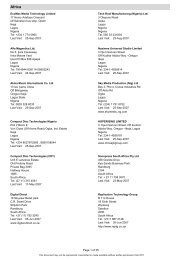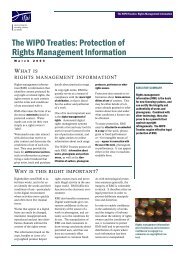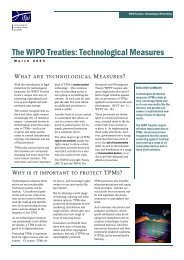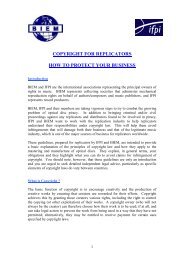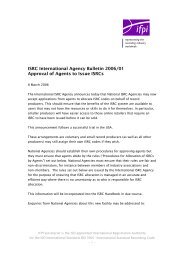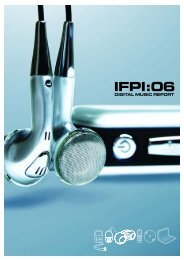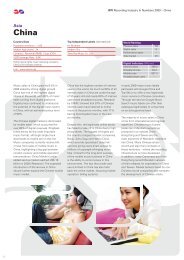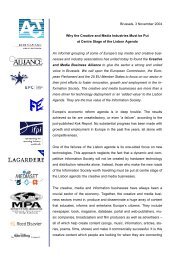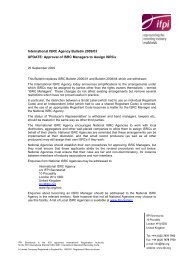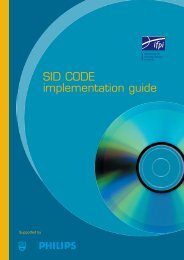*IFIC 20ppv3 - IFPI
*IFIC 20ppv3 - IFPI
*IFIC 20ppv3 - IFPI
You also want an ePaper? Increase the reach of your titles
YUMPU automatically turns print PDFs into web optimized ePapers that Google loves.
PAGE 15<br />
CANADA<br />
There is a special focus on<br />
Canada because of the government’s<br />
inaction on copyright<br />
reform, and, in particular, its failure<br />
to ratify and implement the WIPO<br />
Internet Treaties that would afford<br />
protection to copyrighted works<br />
in the digital environment.<br />
Canada is already in the international<br />
spotlight. The Office of the<br />
US Trade Representative (USTR)<br />
in 2005 maintained the country’s<br />
placement on its Special 301<br />
Watch List, singling out Canada<br />
as a country that must address<br />
significant problems with its<br />
intellectual property rights<br />
(IPR) regime.<br />
According to research company<br />
Pollara, it is estimated that more<br />
than 130 million unauthorised<br />
downloads largely via file-sharing<br />
occur in Canada each month.<br />
This translates into 1.6 billion<br />
downloads per year that do not<br />
earn royalties for artists or tax<br />
revenue for the government.<br />
Canada also faces difficult<br />
challenges with respect to<br />
enforcement against physical<br />
piracy. Illegal CDs and DVDs<br />
originating from South East Asia,<br />
Russia and Pakistan flow freely<br />
into Canada due to weak border<br />
enforcement.<br />
Once the goods enter into the<br />
retail stream, enforcement<br />
becomes even more problematic<br />
as police do not always have<br />
adequate resources to address<br />
operations at this level. While<br />
priority is given to investigations<br />
that deal with importation and<br />
distribution, historically there has<br />
been little cooperation between<br />
federal police and customs<br />
agents. Some progress is being<br />
made through joint operations,<br />
the establishment of a coalition<br />
of rights holders, and training<br />
workshops.<br />
However, Canada’s overall<br />
lack of effective legislation and<br />
enforcement is evident. The<br />
USTR has been compelled to<br />
conduct an out-of-cycle review<br />
to monitor the territory’s progress<br />
“in providing an adequate and<br />
effective IPR regime that is<br />
consistent with its international<br />
obligations and advanced level<br />
of economic development,<br />
including improved border<br />
enforcement.”<br />
KOREA<br />
Korea has rampant internet<br />
piracy which continued unabated<br />
in 2004. Broadband access, at<br />
80% household penetration,<br />
is the highest in the world.<br />
In addition, mp3 downloads<br />
from unauthorised sources to<br />
mobiles have increased sharply.<br />
Legitimate music sales have<br />
fallen drastically, by more than<br />
55% since 2001.<br />
In 2004, legal cases against<br />
unauthorised file-sharing services<br />
progressed through the courts,<br />
and in January 2005 the injunction<br />
issued against the operators<br />
of the file-sharing service<br />
Soribada was affirmed by the<br />
court of appeals. However, on<br />
the same day, a separate criminal<br />
court upheld the dismissal of<br />
separate criminal charges<br />
against Soribada.<br />
The owner of Bugsmusic, the<br />
largest streaming site in Korea<br />
with over ten million members,<br />
was found guilty of copyright<br />
infringement and given a suspended<br />
jail sentence of 18<br />
months and fined approximately<br />
US$20,000. Despite these court<br />
decisions both services continue<br />
to exist. Indeed, in early 2005<br />
Soribada started to charge its<br />
users for the service.<br />
The Korean government has<br />
acknowledged that serious<br />
problems confront both the<br />
international as well as the<br />
domestic recording industry<br />
and has begun to address the<br />
deficiencies in the legal framework<br />
and enforcement structure.<br />
Amendments to the copyright<br />
law, which granted a transmission<br />
right to record producers came<br />
into effect in January 2005.<br />
There were also recent proposals<br />
by three national assembly<br />
members for a comprehensive<br />
reform of the copyright act<br />
and the setting up of a joint<br />
enforcement agency.<br />
However these proposals do<br />
not go far or proceed quickly<br />
enough to adequately help the<br />
industry. The government<br />
urgently needs to ensure that<br />
provisions within the copyright<br />
laws deal effectively with unlawful<br />
reproduction over the internet.<br />
Drugie Pavila, Russia<br />
“After we realised how many people and how much<br />
investment is needed to create a band like ours, we started to<br />
see piracy differently.The competition we won involved 8,000<br />
participants, who all dreamed of becoming artists.The level<br />
of piracy in our country means that almost none of these<br />
talented young singers will have the chance we had to start<br />
a career, as the record company will not be able to reinvest<br />
the money from sales of our album.”



